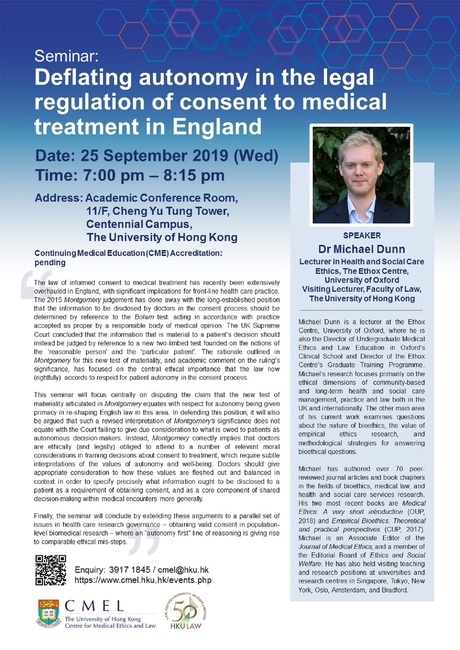PowerPoint Slides:
Click here
Video:
Click here
Abstract:
The law of informed consent to medical treatment has recently been extensively overhauled in England, with significant implications for front-line health care practice. The 2015 Montgomery judgement has done away with the long-established position that the information to be disclosed by doctors in the consent process should be determined by reference to the Bolam test: acting in accordance with practice accepted as proper by a responsible body of medical opinion. The UK Supreme Court concluded that the information that is material to a patient’s decision should instead be judged by reference to a new two-limbed test founded on the notions of the ‘reasonable person’ and the ‘particular patient’. The rationale outlined in Montgomery for this new test of materiality, and academic comment on the ruling’s significance, has focused on the central ethical importance that the law now (rightfully) accords to respect for patient autonomy in the consent process.
This seminar will focus centrally on disputing the claim that the new test of materiality articulated in Montgomery equates with respect for autonomy being given primacy in re-shaping English law in this area. In defending this position, it will also be argued that such a revised interpretation of Montgomery’s significance does not equate with the Court failing to give due consideration to what is owed to patients as autonomous decision-makers. Instead, Montgomery correctly implies that doctors are ethically (and legally) obliged to attend to a number of relevant moral considerations in framing decisions about consent to treatment, which require subtle interpretations of the values of autonomy and well-being. Doctors should give appropriate consideration to how these values are fleshed out and balanced in context in order to specify precisely what information ought to be disclosed to a patient as a requirement of obtaining consent, and as a core component of shared decision-making within medical encounters more generally.
Finally, the seminar will conclude by extending these arguments to a parallel set of issues in health care research governance – obtaining valid consent in population-level biomedical research – where an “autonomy first” line of reasoning is giving rise to comparable ethical mis-steps.
Spearker:
Dr Michael Dunn
Lecturer in Health and Social Care Ethics, The Ethox Centre, University of Oxford
Visiting Lecturer, Faculty of Law, The University of Hong Kong
Dr Michael Dunn is a lecturer at the Ethox Centre, University of Oxford, where he is also the Director of Undergraduate Medical Ethics and Law Education in Oxford’s Clinical School and Director of the Ethox Centre’s Graduate Training Programme. Michael’s research focuses primarily on the ethical dimensions of community-based and long-term health and social care management, practice and law both in the UK and internationally. The other main area of his current work examines questions about the nature of bioethics, the value of empirical ethics research, and methodological strategies for answering bioethical questions.
Michael has authored over 70 peer-reviewed journal articles and book chapters in the fields of bioethics, medical law, and health and social care services research. His two most recent books are Medical Ethics: A very short introduction (OUP, 2018) and Empirical Bioethics: Theoretical and practical perspectives (CUP, 2017). Michael is an Associate Editor of the Journal of Medical Ethics, and a member of the Editorial Board of Ethics and Social Welfare. He has also held visiting teaching and research positions at universities and research centres in Singapore, Tokyo, New York, Oslo, Amsterdam, and Bradford.
Continuing Medical Education (CME) Accreditation:
Click here


